- Home
- Alex Archer
The Lost Scrolls Page 4
The Lost Scrolls Read online
Page 4
She saw the faces of the dead. The beatnik-looking Naser, darkly pretty Maria, cheerful Szczepan Pilitowski, who had died giving Annja a chance to save Jadzia, the scrolls and herself. Ismail – Dr. Maghrabi – who had tried to shield them all with his body, and had been ruthlessly gunned down.
Is this what it means to carry the sword? a lonely child's voice asked from the wilderness of Annja's mind. She already knew the answer.
She could hear the gruff voice of her sometime mentor, Roux's, trying to encompass cynicism and compassion at once, saying, "You cannot save the whole world, child." And she knew that was true, too.
But can't I even save those within reach of my arm?
"See?" Jadzia crowed, sipping at her coffee. "You have no answers for me."
Anger spiked in Annja. She held her body as still as if it were encased in concrete, did not allow the anger to travel so far as her eyes. Jadzia's malice was the petty malice of a spoiled child, she reminded herself. Innocent malice, if there was such a thing.
And surely there was. By no stretch of her vivid imagination could Annja see Jadzia setting about the callous murder of a dozen helpless, harmless men and women. Her petty rudeness belonged in a different universe from such an act.
Oddly, the very act of restraining herself from lashing back at Jadzia made Annja feel better. "I still think it was most likely Muslim fanatics," she said in an only slightly constricted voice.
"Why would they attack our dig? Why would they care?" Jadzia asked. "We've never heard a peep from Islamists. No threats, not anything. And the Muslim Brotherhood has very much to do already."
Such as waging an increasingly successful campaign to dislodge the fairly secular Egyptian government, Annja thought. She already saw the sand leaking out of her theory anyway. She had knocked around, and been knocked around of late, enough to have uncomfortably firsthand knowledge of Western special-operations gear. The attackers had worn Western-style blackout dress and night-vision goggles, and carried the generic Western counterterrorism weapon, the MP-5. Presumably the Muslim Brotherhood could buy that stuff and learn to use it. Even at Western expense, given the enormous amounts of military aid and training the U.S. gave Egypt. But for a group as determinedly old-fashioned as the Brotherhood, it seemed distinctly out of character.
Annja took a last sip of her mostly cooled coffee and stood up. "I need to move," she said. "Getting the blood flowing will help me think."
"They conspired against us," Jadzia said again. She dangled her long legs over a parapet of rough dressed stone. Several stories below lay a little shelf of rubble at the base of the citadel wall, and then the water of the Eastern Harbor, slogging and frothing.
Annja paced the terrace behind the Polish girl. White gravel crunched beneath her soles, and she could practically feel the afternoon sun beating on the wide brim of her hat with angry fists. She tried not to think of the risks Jadzia was subjecting herself to. While signs in various languages placed at intervals warned against precisely what the girl was doing, enforcement of safety rules did not seem to constitute a priority for whatever agency had charge of the big, blocky, fifteenth-century fortress of Qait-Bey. Nobody had yelled at her to get down. As for Annja, she already understood that the only way to get Jadzia to stop doing what she was doing was to try to physically prevent her. And the last thing they needed was to draw attention to themselves by getting into a fight.
Actually, the very last thing they needed was for them both to get arrested for causing a public disturbance at a national monument. Her estimate of the Alexandrian police was such that she expected it might take them only seconds to sell the young women to whoever it was who wanted them so dead.
"Why do you blame the oil companies?" Annja asked. She hated to feed Jadzia's probable paranoia. But she was out of other answers, and a brisk walk through winding streets and out to the tip of the peninsula through growing morning heat hadn't done a damned thing to replenish her stock. Although Jadzia's constant whining was at least a bit of a distraction, she had to admit.
"They have the most to lose from what we might discover," the young Polish woman said.
Annja stopped and looked at her. "What did you find in those scrolls, anyway?"
Jadzia shrugged and kicked the heels of her tennis shoes against the yellow sandstone. They were the only part of her ensemble of the night before Annja had let her keep. "You were there for one of the most tantalizing parts."
"That bit about the crystals? That just sounded like New Age craziness warmed over."
Jadzia laughed. "Right. Twenty-five hundred years old is very new."
"But, I mean, that charging-crystals stuff – "
"We found more earlier. It spoke of all those things you found so funny – flying chariots, artificial lights, lances of light. The ancient Greek who wrote those scrolls, who somewhere got a much purer version of the story than Solon passed down to Critias, he did not have the language of technology to describe an artificial power source. He probably didn't understand it. Some kind of divine gift, like Zeus's lightnings chained, would be the closest he could come to expressing it."
"But using gemstones for batteries," Annja said. "I'm no physicist, but that sounds pretty implausible."
An Air France Airbus climbed past them from its takeoff roll, momentarily blanking out the conversation in the scream of its engines. "What?" Annja shouted.
"I said, how would that airplane strike an ancient Greek? Implausible, yes? Everything is impossible until someone does it."
Annja sought an answer to that and could find none that didn't ring as hollow as a pewter doubloon. Come on, she told herself. Is she really that much smarter than I am? Or am I letting myself get intimidated, just because everyone told me what a supergenius she was?
Annja had been arguably the brightest girl in the orphanage where she was raised. It had gotten her knuckles rapped by the nuns for being a smart aleck, and had seen her shunned sometimes by girls who thought she was too smart for her own good.
But she thought she had gotten over the expectation of being the smartest person in the room by about the middle of her first semester as a college freshman. So even if Jadzia was smarter than her by some great yawning gap, it did not follow she had to think herself stupid.
"How would something like that work?" she asked. "Storing energy that way."
Jadzia shrugged. "I am no physicist or engineer, either. But perhaps in some way involving the molecular bonds of the crystalline structure itself?"
That brought Annja up short. That did sound plausible. At least close enough, given she was so ignorant of what she'd really need to know to evaluate the possibility that she didn't even feel bad about it. She had her own abstruse specialties, she reminded herself, and if crystallography wasn't among them, that was just okay.
"All right," she said, "I'll grant the possibility. On a purely hypothetical basis. But so what?"
"The scrolls could prove alternate energy sources were available," Jadzia said, "without the inefficiencies of wind or solar power, or the risks of nuclear."
Annja shook her head and laughed. "It's not as if they contain a set of blueprints for harnessing that power."
Jadzia's smile widened until she reminded Annja forcibly of a cat who'd just discovered how to work the catch on the birdcage. "But maybe that's – " she patted the green-and-purple synthetic bag plumped beside her on the wall " – still in here."
"So what do we do now?" the young woman asked.
Jadzia sat on a wall again, drumming her heels against it. This time it was a short retaining wall high up on the town's ancient acropolis, looking out over the strip of city lights running along the darkness of the Mediterranean. Above her left shoulder, illuminated by floodlights at the base, rose the shiny red granite obelisk miscalled Pompey's Pillar. Annja knew it was actually built by Diocletian on the ruins of the Temple of Serapis in 297 A.D. Off to her right a smallish sort of Sphinx lay pensive on its pedestal.
Annja paced dow
nslope of her this time, without great energy but still driven. Reaction had set in. They had passed the afternoon wandering in and out of shops in a daze. Annja could remember nothing specific of what they had seen.
They had dinner at a couscous restaurant. Even with ample doses of hot sauce it tasted like wood chips to Annja. They had talked some, sporadically, in muted voices. That was how shock-fatigued they had become. Jadzia was too wasted to be either loud or nasty.
She had told Annja some of her story. She proudly claimed descent from Mozart, which struck Annja as implausible. To Annja's surprise the girl had been born in the United States, eighteen years before, meaning she carried dual citizenship. Her father, a mathematics professor at the University of Krakow, had been a vocal supporter of the Solidarity labor-union movement. When the Soviet-backed Polish regime had cracked down on Solidarity and arrested its leader, Lech Walesa, Jadzia's father had fled to the U.S. Sobieslaw Arkadczyk moved in with cousins in Chicago and took a job as a plumber.
While there he had met, through friends, a young Polish woman finishing her Ph.D. in economics at the University of Chicago. They had fallen in love and married.
After political reform brought an effective end to the Communist regime, the couple returned to their homeland. With them went their two-year-old daughter, Jadzia. They were soon both teaching at Krakow University. Sobieslaw's having been exiled for supporting Walesa, who became the nation's president in 1990, probably hadn't hurt their opportunities.
Jadzia had shown signs of extraordinary gifts at a young age. Annja got the impression Sobieslaw and Roksana, Jadzia's mother, were probably looking pretty hard. Parents did that, Annja knew from observing her contemporaries who had produced offspring. She had no direct experience with parents of her own that she could remember.
In Jadzia's case, genius wasn't all in her parents' eyes, it seemed. Tests demonstrated that she had an astonishing facility for languages, as well as a talent for mathematics.
She was, perhaps inevitably, relentlessly indulged from a very early age.
Jadzia learned to read at the advanced age of three. She did so voraciously. As Annja had, she quickly fell in love with the intrigue and adventure and romance of history. That led to a near obsession with ancient languages.
Oddly, she chose not to study specific languages at school. "Why?" Annja asked.
"I learn them perfectly well by myself," she replied matter-of-factly.
Instead she studied linguistics and cryptology, the better to decipher unknown languages and tantalizing fragments.
As the sun set and Jadzia finished her story, they had drifted up the hill. Wandering the tourist attractions had kept them masked by crowds during the day. They had already checked out of the hotel where they had spent half of last night, and locked their baggage, except for the scrolls, in lockers at the train station. Tonight they would check into a new hotel as late as possible. Hostelries had to report all foreign guests to the police. The later the pair showed their passports, though, the more likely the hotel staff was to wait until morning to pass the information along to the police. And the less likely the police were to actually notice them at all. Just because their pursuers could readily bribe the Alexandrian police didn't mean they could make them efficient.
And now at last Jadzia had asked the question, literally, of life and death: What do we do now?
"We have to find a way to get whoever is hunting us off our backs," Annja answered.
"How can we do that?"
"We could give them what they want."
"Sure," Jadzia sneered. "And then they kill us anyway."
She had gotten so lethargic Annja was almost relieved to see her get snotty again. Almost.
"That's true," she said.
"What? You aren't going to accuse me of conspiracy theories?"
Annja laughed without a lot of humor. "As you pointed out, somebody really is conspiring against us. But what if we were to negate the value of what you're carrying?"
The girl's eyes turned to blue slits of suspicion. "What do you mean?"
"Release the information the scrolls contain," Annja said. "If whoever's after us is willing to kill to keep the information secret, and I confess I can't think of any other reason they attacked you, then it stands to reason that if we make the information public, they'll have no more incentive to kill us. Doesn't it?"
"What if they still want to kill us for revenge?"
Annja shrugged. "It's possible. But murder is an expensive proposition, even for the rich and well-connected. Continuing a vendetta against a couple of young women – who have incidentally become world-famous figures – might not make a whole lot of sense when vast profit or power no longer lie at stake. Whoever ordered the hit on your dig team, whether it was a corporate executive or government minister, probably has powerful rivals who aren't any more scrupulous than he is. Wasting resources closing the barn door after the horse has escaped might be all the pretext such rivals might need to make a move against him."
She held her breath then, uncertain of whether the girl was going to go off on her or not. She was like nitroglycerin.
But Jadzia smiled, then laughed. "Twisted," she said. "I like the way you think."
And what would worldwide notoriety do for my career? Annja wondered. As an archaeologist, as a consultant for Chasing History's Monsters, as champion of good?
She shrugged. A lot less harm than getting abruptly dead in the next few days, she conceded to herself.
"But what about revenge?" Jadzia asked.
Annja did not particularly care for the gleam she saw in the young Polish linguist's eyes. In part that was because she wasn't so sure it wasn't shining from her own.
She found herself smiling. "Can you think of anything better," she asked, "than revealing the secret they want so very badly to keep?"
Chapter 6
"We're still waiting," the fresh-faced Mormon guy said. Although his hair didn't seem to be receding he managed to show a lot of forehead in the late-morning sunlight. His forehead bulged, somehow.
"For what?" Jadzia asked.
Seagulls wheeled over the Bay of Naples in the bright blue morning sky, complaining of fate. The Mediterranean wind stirred the scrubby pines dotted across the hillside and rattled dust and small porous pebbles against larger rocks and randomly rearranged them in clumps at the bases of the wiry plants. The square smelled of dust and ancient dressed stone and not-so-ancient hot asphalt from the parking lot. Annja felt the weight of time and mortality as she and Jadzia walked with their attentive guides through the ruins of Herculaneum.
Which was a familiar and pleasant feeling for the archaeologist.
The two women were being escorted through a ghost town of pallid stone by several researchers from Brigham Young University and a few employees of the small Herculaneum museum, which, like the site as a whole, was closed to the public at the moment. Annja and Jadzia were getting a personal tour as a professional courtesy.
The researchers seemed excited to meet Annja, a genuine television celebrity, and one from their field – one moreover who might somehow be able to bring the manna of airtime or even coveted television-network dollars to their project. But Jadzia they actually seemed to regard with awe. It was as if a rising baseball superstar were visiting another team's locker room.
"For the permission by the Italian government," said Pellegrino. In his early thirties, he was the oldest of the museum crew. He was short and wiry, if a bit bandy-legged. He wore a horizontally striped red-and-blue jersey over shorts. "Further excavation has been held up until the ministry decides whether to give priority to a conservation strategy first."
"Or until the Americans come up with a bigger bribe," said Tancredo, a tall young man with a shock of straw blond hair, blue eyes and a Lombard accent.
The volcano-doomed Roman village perched on the warty flank of the mountain that killed it, alongside the modern village of Ercole. This part of the Bay of Naples was postcard-pretty, and see
mingly placid despite the volcano's vast gray dome hulking overhead. But it sported a history almost as long and dense as the land Annja and Jadzia had just left on the other side of the Mediterranean.
"There are legitimate issues at stake!" yelped Tammaro, the third and youngest of the museum crew, who was very short indeed and looked as if he hadn't shaved in three days. The locals had all been speaking Italian. Now Tammaro, stung by the blond northerner's suggestion, bubbled into expostulating in the local dialect, quite different from standard Italian. Annja could barely follow.
The Mormon, whose name was Tom Ross, shrugged. He spoke in English. Still, from his body language Annja guessed he had followed the Italian conversation about as far as she had. He had told the visitors he had done his mission in Italy before returning to Brigham Young University, where he was a graduate student.
"A few of us keep on keeping on here," he said, causing Annja to wonder if this cheerful straight-arrow had any inkling of the phrase's origin in the drug-happy sixties. "The ministry's been promising to get us word 'any time now' since about February." BYU, it seemed, wasn't wasting any full professors on a prospect as tenuous as an Italian ministry doing its job.
Pellegrino scowled and said a word Annja was unfamiliar with. She guessed it was a curse of some sort. Her guess seemed confirmed when Jadzia burst into loud high-pitched giggles. Tammaro hunched his head between his shoulders like a startled turtle and scowled ferociously, an effect somewhat spoiled by the fact that he also turned beet-red.
They walked through a broad courtyard or smallish plaza between the stone faces of excavated buildings, some two stories tall. A palm tree waved badly weathered fronds, half of them dead and brown, in the insistent breeze. The empty doorways and windows looked like openings into skulls, and the sense of desolation was palpable despite the fact they walked through what amounted to a very vital modern city. Maybe it was the sudden and horrid fashion in which so many lives had been snuffed at once by one of Mother Nature's better-known disasters.

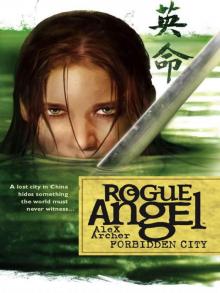 Rogue Angel: Forbidden City
Rogue Angel: Forbidden City The Spider Stone
The Spider Stone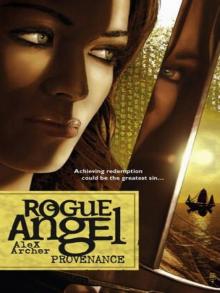 Provenance
Provenance Blood Cursed
Blood Cursed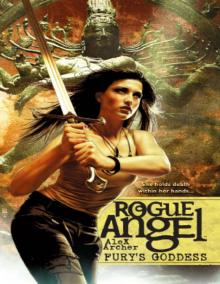 Fury's Goddess
Fury's Goddess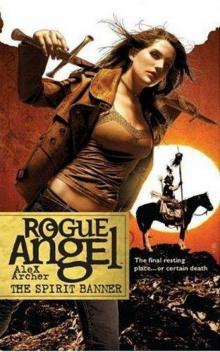 The Spirit Banner
The Spirit Banner Footprints
Footprints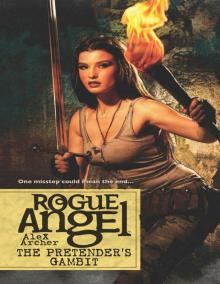 The Pretender's Gambit
The Pretender's Gambit Rogue Angel: The Lost Scrolls
Rogue Angel: The Lost Scrolls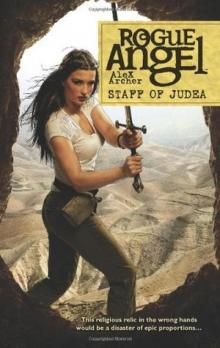 Staff of Judea
Staff of Judea Rogue Angel 55: Beneath Still Waters
Rogue Angel 55: Beneath Still Waters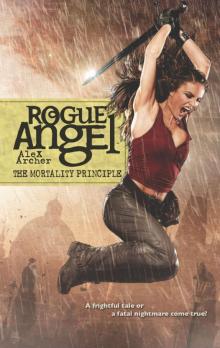 The Mortality Principle
The Mortality Principle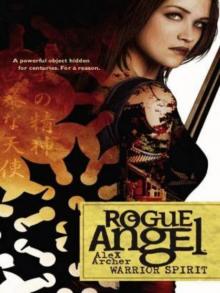 Warrior Spirit
Warrior Spirit Paradox
Paradox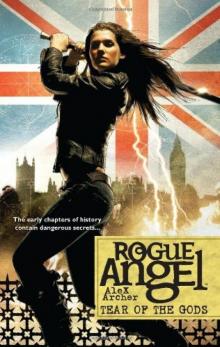 Tear of the Gods
Tear of the Gods Forbidden City
Forbidden City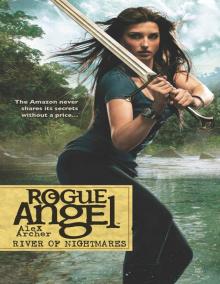 River of Nightmares (Rogue Angel)
River of Nightmares (Rogue Angel)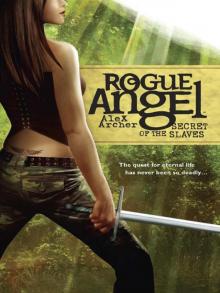 Rogue Angel: The Secret of the Slaves
Rogue Angel: The Secret of the Slaves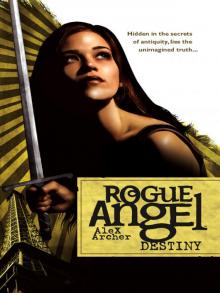 Destiny
Destiny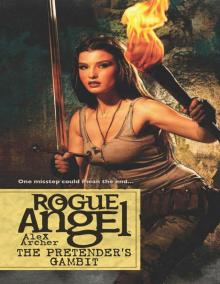 Rogue Angel 51: The Pretender's Gambit
Rogue Angel 51: The Pretender's Gambit Celtic Fire
Celtic Fire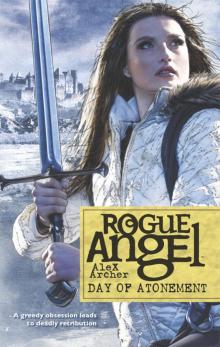 Rogue Angel 54: Day of Atonement
Rogue Angel 54: Day of Atonement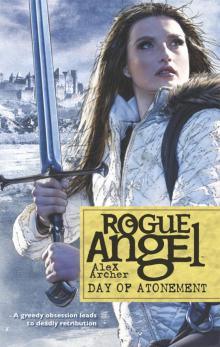 Day of Atonement
Day of Atonement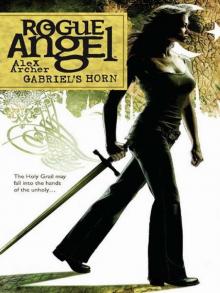 Rogue Angel: Gabriel's Horn
Rogue Angel: Gabriel's Horn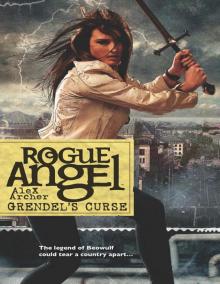 Grendel's Curse
Grendel's Curse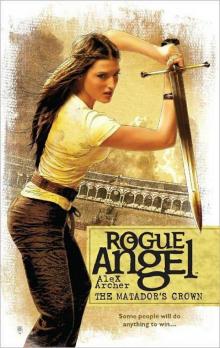 The Matador's Crown
The Matador's Crown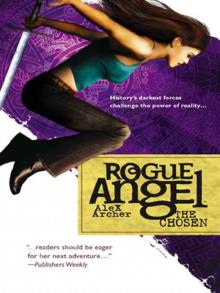 Rogue Angel: The Chosen
Rogue Angel: The Chosen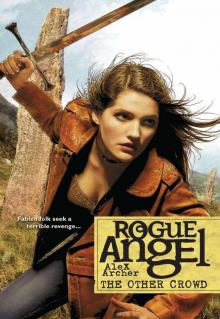 The Other Crowd
The Other Crowd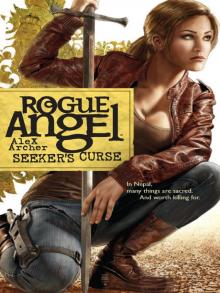 Seeker’s Curse
Seeker’s Curse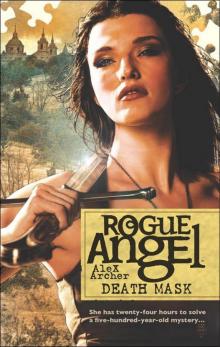 Rogue Angel 52: Death Mask
Rogue Angel 52: Death Mask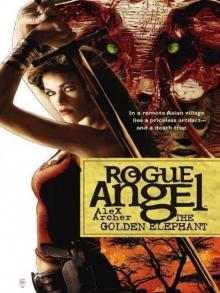 The Golden Elephant
The Golden Elephant Blood Cursed (Rogue Angel)
Blood Cursed (Rogue Angel) Celtic Fire (Rogue Angel)
Celtic Fire (Rogue Angel)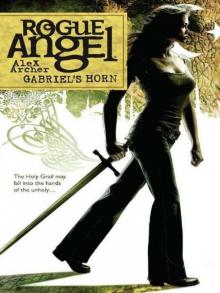 Gabriel's Horn
Gabriel's Horn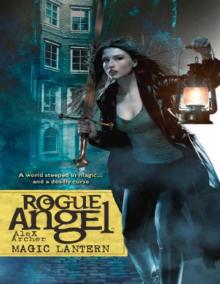 Magic Lantern (Rogue Angel)
Magic Lantern (Rogue Angel) God of Thunder
God of Thunder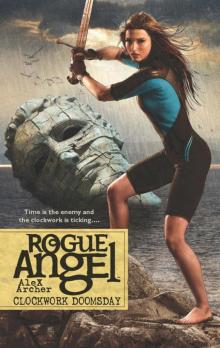 Clockwork Doomsday
Clockwork Doomsday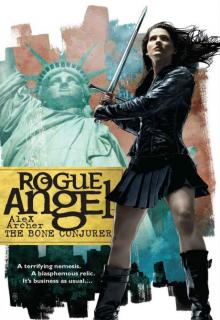 The Bone Conjurer
The Bone Conjurer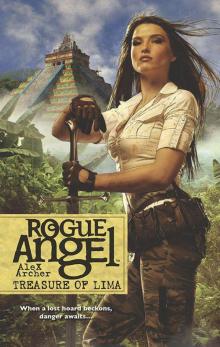 Treasure of Lima
Treasure of Lima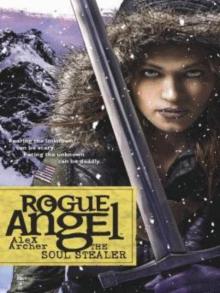 The Soul Stealer
The Soul Stealer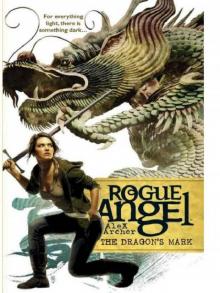 The Dragon’s Mark
The Dragon’s Mark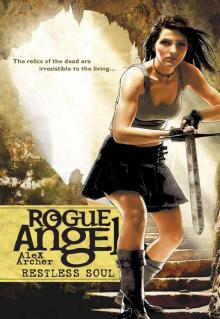 Restless Soul
Restless Soul Rogue Angel: God Of Thunder
Rogue Angel: God Of Thunder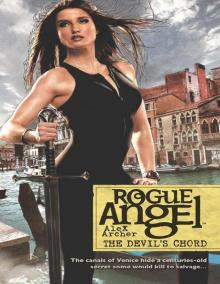 Rogue Angel 49: The Devil's Chord
Rogue Angel 49: The Devil's Chord Death Mask
Death Mask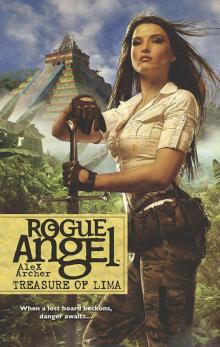 Rogue Angel 46: Treasure of Lima
Rogue Angel 46: Treasure of Lima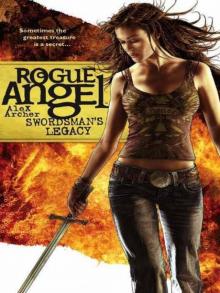 Swordsman's Legacy
Swordsman's Legacy The Oracle's Message
The Oracle's Message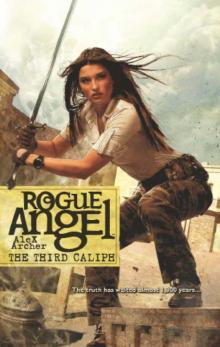 The Third Caliph
The Third Caliph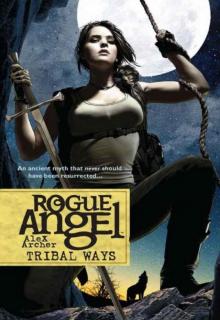 Tribal Ways
Tribal Ways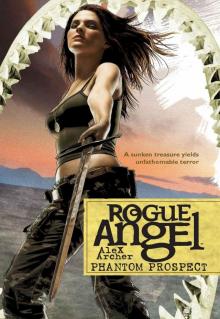 Phantom Prospect
Phantom Prospect Rogue Angel 50: Celtic Fire
Rogue Angel 50: Celtic Fire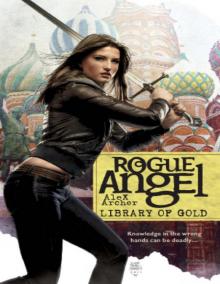 Library of Gold
Library of Gold Rogue Angel 53: Bathed in Blood
Rogue Angel 53: Bathed in Blood Sacred Ground
Sacred Ground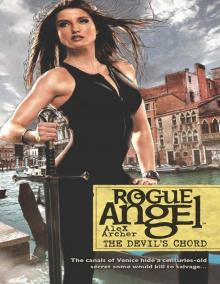 The Devil's Chord
The Devil's Chord Serpent's Kiss
Serpent's Kiss The Vanishing Tribe
The Vanishing Tribe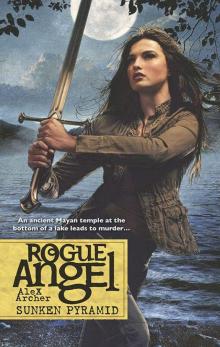 Sunken Pyramid
Sunken Pyramid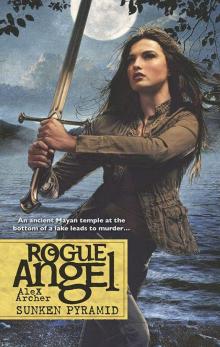 Sunken Pyramid (Rogue Angel)
Sunken Pyramid (Rogue Angel)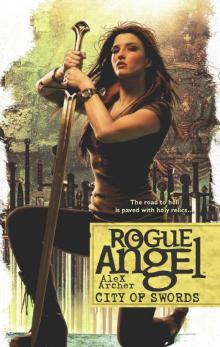 City of Swords
City of Swords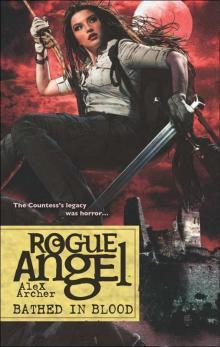 Bathed in Blood
Bathed in Blood The Lost Scrolls
The Lost Scrolls The Babel Codex
The Babel Codex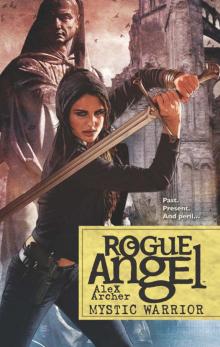 Mystic Warrior
Mystic Warrior Eternal Journey
Eternal Journey Beneath Still Waters
Beneath Still Waters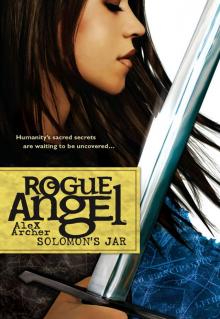 Solomon's Jar
Solomon's Jar Beneath Still Waters (Rogue Angel Book 55)
Beneath Still Waters (Rogue Angel Book 55) Cradle of Solitude
Cradle of Solitude Secret of the Slaves
Secret of the Slaves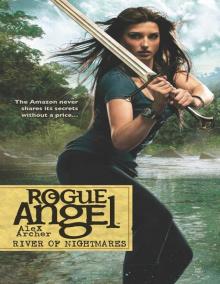 River of Nightmares
River of Nightmares Polar Quest
Polar Quest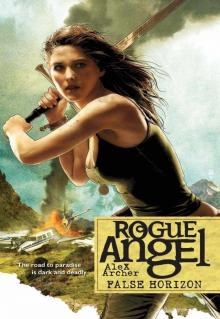 False Horizon
False Horizon